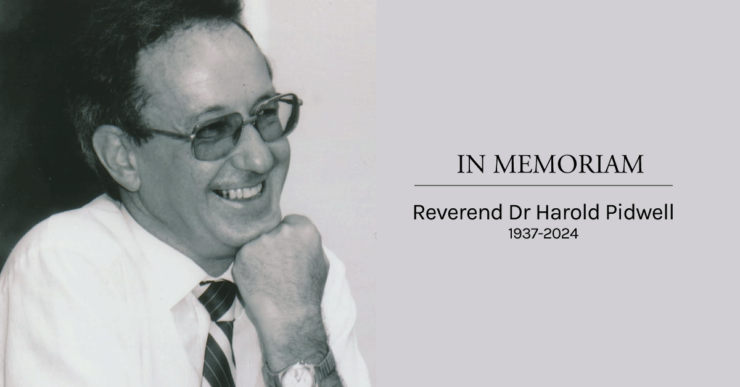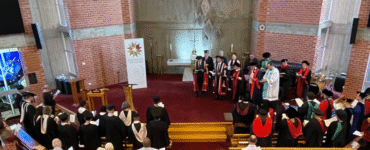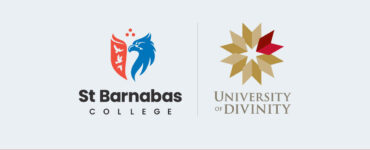The University community mourns the passing of Reverend Dr Harold Pidwell BD, MTh, Doctor of Sacred Theology. Harold was the Dean and Registrar of the Melbourne College of Divinity from 1991-2001. He passed away on 25 September 2024 in Cambridge, New Zealand. The Venerable Dr Colleen O’Reilly AM, a former colleague of Harold, has kindly prepared the following personal tribute.
This is very much a tribute from my perspective 1994-1999.
The Rev’d Dr Harold Pidwell, Dean of the (then) Melbourne College of Divinity was a marvellous colleague, a team leader who drew people in and valued their contribution, and a visionary in developing theological education in a landscape that was changing rapidly.
In 1994 I was appointed to the newly created position of Associate Dean and Director of Ministry Studies in the MCD. My previous appointment had been as the Dean of Postgraduate Studies in the Sydney College of Divinity and a member of the faculty of the United Theological College in North Parramatta, in Sydney. My tasks at MCD were to organise the longstanding and revered Bachelor of Divinity post-graduate degree, which was not taught but examined by the College, to develop the Master of Ministry degree that had already commenced, under the later Rev’d Dr John Paver’s leadership, and introduce a new Doctor of Ministry Studies degree. These were ground-breaking programs in Australian theological education. Until the MCD pioneered these professional qualifications, they had only been available overseas.
Their distinctive character was in the requirements that a candidate had to have a developed practice in ministry and attend collegial learning groups and residential schools before writing a dissertation. The ecumenical and national nature of the programs was enriching, and we were able to attract lecturers from the various MCD colleges to provide stimulating and up to date scholarship for people whose ministry contexts ranged from parishes, schools, hospitals, prisons, and the military.
Harold developed the networks between the various theological consortia then in existence in Australia and New Zealand. He brought to his vision for future directions, a bounty of experience from his work in New Zealand, the country of his birth, and his studies and teaching in Switzerland and the USA. He gathered the deans of consortia, he worked with the College’s governing body to develop studies with the universities, and he ensured that the MCD ‘s colleges were each able to maintain their distinctive ethos while co-operating ecumenically at the highest level.
Harold was a great encourager of people. At his funeral in Auckland, which I watched on the livestream, it was said he frequently advised people or supported them to take paths that shaped their lives for the better. That was true for me. Coming to Melbourne made it possible for me to be ordained a priest in the Anglican Church, something still not possible for women in Sydney. Harold taught me an important lesson in delegating when he needed to be on leave for some months for heart surgery. He said to me, as I took up the role of Acting Dean, that the decisions I made would be the ones he would have made, and if not, only I would hear about it. I took that with me into parish ministry when working with curates.
The MCD office in Highbury Grove was a very enjoyable workplace. My former pa said to me when we were talking this week about those days, that it had been the happiest of all her workplaces. We always stopped for coffee about 10.30am and sat around the kitchen table for a good 20 mins or so, being colleagues and friends, welcoming anyone from the Colleges who might have been there, talking about what was ahead in the MCD’s calendar, and creating the conditions for a fruitful outcome of our work together.
Dr Ruth Pidwell, Harold’s wife also became a friend. In fact, I had met Ruth during her Master’s studies before I met Harold at an SCD accreditation process in Sydney. Sitting at one end of the table as I made the case for the SCD’s first higher degree, I was very aware of the man from the highly regarded and venerable MCD at the other end, rightly scrutinising our work. Thankfully, Harold approved the SCD’s submission.
During the week Ruth and Harold lived in a flat on the second story of the former manse in which our offices were located and spent their weekends in Blairgowrie on the Mornington Peninsula. Ruth’s beloved boxer dog Chevvy also occasionally visited us downstairs.
I was very sad indeed to hear the news of Harold’s death. He led the MCD to a new prominence in the growth of degrees in theology and ministry and was always seeking to honour the significant history while creating the future. I am among those many mourning him for whom his confidence in me and his collegiality and friendship have made an enormous contribution to who I am today.
Professor Paul Beirne (MCD Dean, 2001-2012; Registrar 2001-2002), has kindly prepared the following personal tribute.
Extract from: PACIFICA
Australasian Theological Studies
Volume 23, Number 2, June 2010
Melbourne College of Divinity 1910 – 2010
A Selective Historical Overview
Paul Beirne
Part II: The Ongoing Quest for Identity
On 1 March 1997, a Conference to explore and shape the future direction of the Melbourne College of Divinity—the Towards 2010 Conference—was held at the University of Melbourne. As a result of the Conference, the governing body, the College, on 19 March 1997, set up a Task Force to examine and report on seven areas deemed vital to the future activities of the MCD.
The Task Force worked through four committees; Technology and Distant Education; MCD Libraries; Finance; and the Purpose and Role of the College. The Task Force presented a Report to the 24th March 1999 meeting of the College. A major recommendation of the Task Force was to develop a Policy and Development Committee, whose foundation Chair and Convener was Bishop Andrew Curnow.
On 21 August 2000, the Policy and Development Committee promulgated a Green Paper entitled The MCD—Toward the Third Phase. . . .Subsequently, a Draft White Paper was compiled by the Committee, and was presented to the College on 25 October 20O1. It was then circulated throughout the MCD for comment at a Staff Consultation Day on November 2001.
******************************************
Harold Pidwell who guided the above was a listener rather than a speaker. But on the occasion he did speak, people of all ages and backgrounds would sit quietly and listen. Why? Because Harold modelled what true listening and then acting is.
I was living and working in Seoul, South Korea when I first met Harold in rather unusual circumstances. I was with my partner Anna and our two children, Sarah and Sean at the time and we were very content with our lives and had no intention of moving anywhere else but South Korea. Meanwhile, my mother was in Brisbane and she would scour the local newspapers to see if there was anything that our little team might appreciate knowing, and if there was, she would cut the piece out of the paper and mail it to me via ‘snail mail’ in Seoul. (It was quite a long time ago and lines of communication were nothing like they are now.)
One day I was reading The Leader, the Australian Catholic newspaper that Mum had sent me. I breezed through it and was going to throw it in the bin when something caught my eye. On the vacancies page at the back of the paper there was a large advertisement for ‘An Assistant to the Dean of the Melbourne College of Divinity’ to begin work in three months. I said to myself “what the heck”, sent the application in and didn’t give it another thought, secure in the knowledge that South Korea would prove a bridge too far to bother even acknowledging my submission.
How wrong I was.
A letter arrived 10 days later in which there was a return trip ticket to and from Melbourne and a note from Harold Pidwell inviting me to Melbourne for an interview.
This was the first time I met Harold, and we took an immediate liking to each other. At that time the central administration of the MCD comprised just three people—Harold who worked for, and represented, the seven colleges that comprised the MCD, and two secretaries. Under Harold’s guidance I learned that the times were very tough, as the MCD headquarters had so little money coming in that he had to secure a loan from the bank to pay the bills at the very end of every month; then he had to arrange a bank loan at the very beginning of the new month and watch it steadily dwindle away.
A lesser person would have thrown up their hands in despair, but Harold Pidwell was definitely not a lesser person—far from it. In his own quiet way Harold was an exact model of faith in the Almighty, and trust in what was possible. Then he went straight ahead and achieved it.
I quote from my article in The Melbourne College of Divinity: A Selective Historical Overview: Volume 23, Number 2, June 2010, page 132:
In 2001, as a result of extended submissions and tenacious work by the Dean, Harold Pidwell, the MCD was listed by the Commonwealth Department of Education, Science and Training as a Schedule I institution, together with all the Australian universities. This listing enabled the MCD to receive Commonwealth funding to support research in the form of a Research Training Scheme, an Institutional Grant Scheme, Australian Postgraduate Awards, Institutional Postgraduate Scholarships, and Australian Research Council Grants. Commonwealth funding for research increased five-fold in the following eight years.
The University of Divinity owes a huge debt to Harold Pidwell which should never be forgotten. He was a gentle man with a fighter’s instinct, a lethal combination which was exactly what was required at that time. Invariably, his quiet persistence won the day. And Ruth was there at his side at every moment, listening, encouraging, guiding, loving . . . right to the end. . .
May Harold Pidwell rest in the peace he so thoroughly deserves, once he’s sorted out the politics in Heaven.







Beautifully expressed, Colleen. A fine tribute to a fine man.
Vale Harold.
I had the benefit of Harold’s warmth an encouragement when in service in emerging independent colleges, long before my MCD/UD engagement.
Harold helped set standards and vision for our sector.
It was Harold who had the vision for Federal research funding for the MCD and worked so effectively to achieve it. The result was a transformation of our then shoe-string budgets and inadequate administrative structure, and with all that so much change in our self-image. Becoming a University was the outcome and we owe so much of that to Harold.